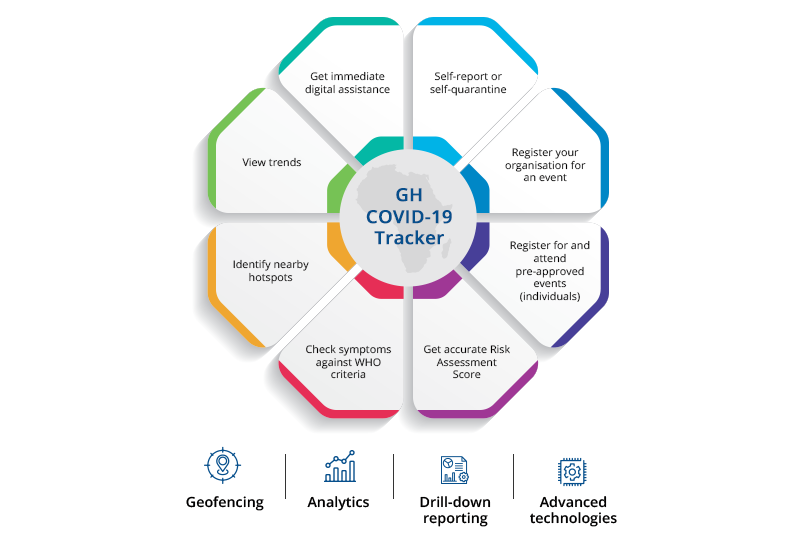The 4th Industrial Revolution is making waves in Africa. Amid the common sentiment that Africa may have missed out on the previous industrial revolutions, this time around, the stakes are quite high. But all things considered, the odds, today, seem to be in the continent’s favour. Meanwhile, Ghana has entered a remarkable phase of transformation, growth and change. Technology has been one of the biggest allies of the country, steering prosperity and progress along its route. As Ghana’s success story continues, Ascend Digital Solutions partners with the Government of Ghana, the country’s private institutions and its people to open a new chapter in this revolutionary journey.
The world’s adoption of Industry 4.0 is defined by a range of technologies – from 3D printing to Artificial Intelligence, Machine Learning, Analytics and the most iconic of these, the Internet of Things. Industry 4.0 represents the coming together of the digital, organic, and physical realms, enabled and accelerated by these new, emerging and advanced technologies.
The 4th Industrial Revolution is set to transform Africa. Major technological advancements are driving Africa’s adoption of Industry 4.0. For example, research reveals that advances in mobile money and related digital services are spurring growth in Africa’s ICT sector, and this trend is expected to continue through 2025.1 And that’s just the tip of the iceberg, when it comes to pan-continent digital transformation.
Among the African nations headlining the Industry 4.0 movement is Ghana. Key to this development is the fact that the Government of Ghana acknowledges that the adoption of Information and Communication Technology (ICT) is mandatory for sustainable economic growth. But, to transform Ghana into a high-income economy that is rich in information, knowledge and skilled manpower, it needs to make strong strides, steered by ground-breaking technological investments.
The 4th Industrial Revolution is expected to touch upon the following cornerstones of the African economy, leapfrogging their development.
- Holistic socioeconomic growth
Industry 4.0 is expected to directly impact the socioeconomic and cultural development of Ghana. The 4th industrial revolution will enable Ghana to steer all-round economic growth and progress. It will empower the government in its fight against poverty, by fuelling financial inclusion, and enable it to bridge the significantly large digital divide. For this to happen, Ghanaians will fundamentally need access to consistent power and broadband internet connectivity, which in turn will open up access to better healthcare and improved quality of life.
Industry 4.0 will also impact how the Government of Ghana dispenses its civic commitments. E-government programs, for example, will see greater growth fuelled by these rapid ICT developments.
- Employing youth
Africa has a massive workforce with the vast majority of the population (57%) under 25. These are youth who stand to benefit immensely from the industrial revolution.
Creating employment for its expanding youth population is also one of Ghana’s priorities – as it is with most other African countries. The government is keenly encouraging developments in this area. Industry 4.0 brings along previously unseen opportunities for Ghana’s employable population. With the rise of industries, the demand for skilled and specialised labour is expected to see a rapid increase, and this trend is may continue through the next decade.
- Attracting foreign and local investments
Ghana is one of the most stable countries in Sub-Saharan Africa, and is a highly favourable investment destination. A growing labour force and a conducive business ecosystem are attractive to investors who look at Ghana as the next big business destination.
Ghana is no stranger to pioneering innovations and adopting them into successful business models. Back in 1992, Ghana was among the first of the African nations to launch a mobile cellular network. Today digitalisation is enabling the industrial and corporate sectors to devise business models that are more profitable in the short term, while remaining socially sustainable in the long run. An environment that promotes growth, and an ecosystem that supports innovation, will together enable more Foreign Direct Investments in Ghana in 2021.
Ascend Digital Solutions: Africa’s partners in success 
Ascend Digital Solutions has been embarking on strategic partnerships to prepare Ghana for Industry 4.0. We are a trusted partner to public institutions across Africa in enabling the real potential of the 4th Industrial Revolution. We are building technology and services-driven platforms that leverage Africa’s diverse and abundant human resources and collaborating with local governments to prepare them for digital transformation.
One of our core missions is to upskill and prime local talent to serve the critical requirements of Africa’s burgeoning knowledge and information economy.
Our commitment is to become a preferred networks and IT services provider to public institutions across Africa, communication service providers/mobile network operators, and commercial enterprises. We believe that such collaboration holds the key to enabling the Government of Ghana and its diverse workforce for the digital revolution that will catapult Ghana to Industry 4.0. ·
Ascend Digital Solutions is partnering with the Government of Ghana to deliver on their ambition of “Digital for all”. We allow private and public players to tap into Africa’s rich digital infrastructure – fibre backbone, metro network, data centres and towers – to build innovative and value-adding service offerings. Digital solutions are a core part of these offerings, covering e-health, e-learning and cybersecurity.
We have embarked on several key projects, most of these are dedicated to building innovative solutions that will:
- Help bridge Ghana’s widening digital divide
- Support socio-economic development, and,
- Enable e-government programs to uplift the economy
In our journey since inception, we have already had some milestone achievements, including the GH COVID-19 Tracker and the Ghana Rural Telephony and Digital Inclusion project.
- Keeping COVID-19 at bay through the GH COVID-19 Tracker
In response to the global COVID-19 pandemic, Ascend Digital Solutions, in partnership with the Government of Ghana, launched a COVID-19 mobile application tracker for Ghana. The app aims to help Ghanaians and foreigners living in the country to stay informed and safe by drawing on advanced capabilities, like geofencing. Following an extensive campaign branded “You Matter”, the app gained significant traction among mobile users, sensitising them on its benefits in protecting their social circles and personal well-being.
The app comes with extensive capabilities, allowing users to completely control their movement and exposure levels to COVID-19. Extensive reporting capabilities show authorities the number of users actively utilising the platform as well as the status of self-quarantined users, along with detailed breakdowns by region, gender, mobility, level of risk and more.

The GH COVID-19 Tracker is available for iOS and Android users for downloading onto smartphones. A version of the app is also available for feature phone users, who can dial *769# to access the USSD menu.
For more information, reach out to: email
- Ghana Rural Telephony and Digital Inclusion project
The Ghana Rural Telephony and Digital Inclusion Project seeks to provide voice and data connectivity to the underserved areas of the nation, covering more than 3.4 million people. The €155-million project is being implemented by the Ghana Investment Fund for Electronic Communications (GIFEC) that functions under Ghana’s Ministry of Communications.
President Akufo-Addo officially launched the novel initiative at Atwereboana, New Edubiase in the Ashanti Region, in November. The project, which will be carried out in collaboration with MTN, Vodafone, Airtel Tigo, Huawei and the Export-Import Bank of China, aims to commission over 2,000 rural strategic sites. The project is part of the government’s initiatives to reduce the country’s digital divide and promote equal opportunities among its citizens. Once completed, it will connect an additional 3,000,000 people to the telecommunications network, bringing them better access to social, economic, health, and educational wellbeing.
To read more about how we’re changing the roadmap of Africa’s socio-economic journey, click here.





